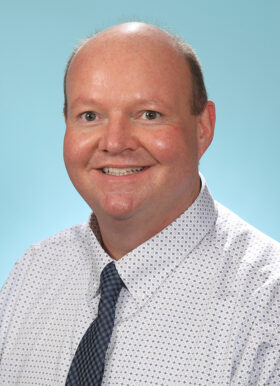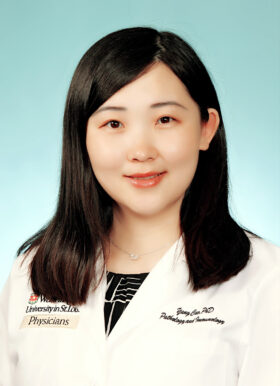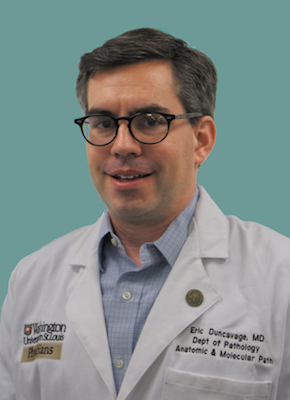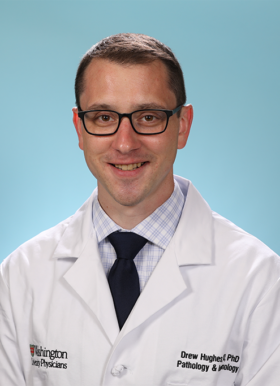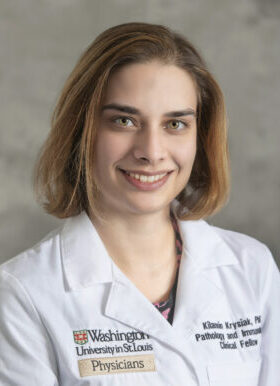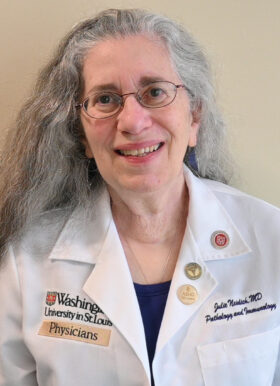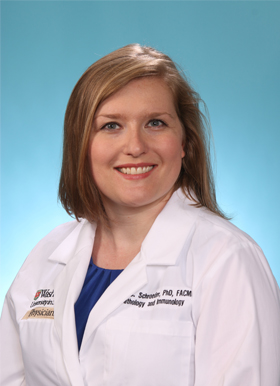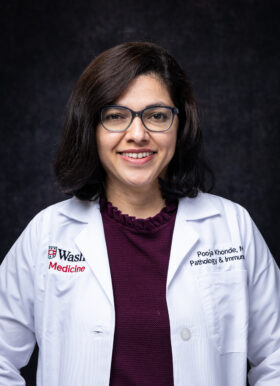
Molecular Genetic Pathology Fellowship
Overview
The Molecular Genetic Pathology (MGP) fellowship program is a joint undertaking between the Divisions of Anatomic and Molecular Pathology and Laboratory and Genomic Medicine within the Department of Pathology and Immunology. The fellowship is accredited by the ACGME and designed to meet the needs of trainees interested in a career focused on the application of molecular genetic techniques to translational science and the clinical laboratory.
Divisions
The Molecular Genetic Pathology (MGP) fellowship program is housed within the Division of Genomic and Molecular Pathology in the Department of Pathology and Immunology. The fellowship is accredited by the ACGME and designed to meet the needs of trainees interested in a career focused on the application of molecular genetic techniques to translational science and the clinical laboratory.
The overall fellowship training is flexible and allows trainees to spend additional time focused on key subspecialty areas of interest within molecular diagnostics. WashU Medicine and Barnes-Jewish Hospital provide the clinical material for the program.
As part of a team of MGP and Laboratory Genetics and Genomics (LGG) trainees, fellows are trained in fundamental and innovative molecular methods that profoundly impact patient care. Our fellows have unparalleled access to cutting-edge technology and faculty experts to promote advanced training in the molecular characterization and diagnosis of solid tumors, hematologic malignancies, infectious diseases, HLA genotyping, disorders of somatic mosaicism and germline testing, including gene panels and clinical exome sequencing. Highlights of training also include in-depth exposure to our MyeloSeq ChromoSeq, and GatewaySeq NGS assays. MyeloSeq is an in-house targeted sequencing assay for genes recurrently mutated in myeloid neoplasms and used for both initial diagnosis and MRD monitoring. ChromoSeq is an advanced diagnostic assay, also developed at WashU Medicine (by two former MGP Fellows). This first-in-class assay is based on whole genome sequencing and provides a comprehensive genomic assessment of newly diagnosed patients with myeloid malignancies. GatewaySeq is our recently developed solid tumor NGS assay that launched in 2024.
In addition to becoming technically proficient, fellows develop the leadership and management skills required to direct a molecular diagnostics laboratory, including but not limited to managing quality assurance and development and validation of new molecular assays. Fellows will also participate in regular didactic teaching sessions with faculty and contribute to department conferences and journal clubs. Fellows are encouraged to present research findings at local and national meetings and are provided with dedicated time to pursue scholarship projects.
The WashU Medicine/Barnes-Jewish Hospital MGP fellowship is among the longest-running such training programs in the country and was the first to offer clinical NGS-based training. Trainees with interact directly with ordering physicians, geneticists, bioinformaticians and research faculty providing a full breadth of training. Previous fellows have pursued successful careers in NIH-funded basic science research, clinical academics, private practice and industry.
The fellowship was approved by Accreditation Council for Graduate Medical Education (ACGME) and began July 1, 2008.
Fellows must be board-eligible or board-certified in anatomic pathology, clinical pathology, or medical genetics.
Training for the fellowship occurs in state-of-the-art facilities at WashU Medicine and Barnes- Jewish Hospital. The fellowship includes laboratory rotations through the Molecular Diagnostics Laboratory, Molecular Infectious Diseases Laboratory and HLA Laboratory at Barnes-Jewish Hospital; Cytogenomics Laboratory, Anatomic and Molecular Pathology Laboratory, CLIA Licensed Environment (CLE) Laboratory at the McDonnell Genome Institute; and the Informatics section of the LGM Division within the Department of Pathology at WashU Medicine. MGP training occurs in a state-of-the-art building on an area of the medical campus known as the CORTEX District (Center of Research, Technology and Entrepreneurial Exchange), and the 680,000- square-foot BJC Institute of Health (BJCIH) at WashU Medicine, an 11-story research building housing laboratories and support facilities.

Transform Your Passion into Expertise
The Molecular Genetic fellowship participates in the NRMP Match Program.
Applications for the 2027-2028 academic year will be available October 1, 2025.
Application Timeline:
- Online Applications available: August 1, 2025
- Application review window: November 2025 – December 2025
- Interview window: Application review window: January 2026-February 2026
Letters of Recommendation will be solicited via our application portal.
Program Director:
Bijal Parikh, MD, PhD
WashU Medicine
Pathology & Immunology
660 S Euclid Avenue
St. Louis, MO 63110
bparikh@wustl.edu
Program Contact:
Naomi Burr
Fellowship Coordinator
Phone: 314-362-3938
burr@wustl.edu
Faculty and Trainees
Let’s Connect
Your questions and feedback are the keystones of our continuous improvement. Whether you’re seeking more information about our services, need assistance from our experts, or want to share your experience, we’re here to listen and respond.
